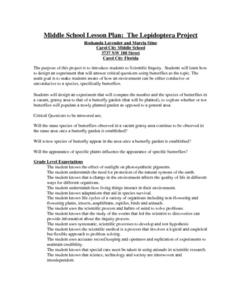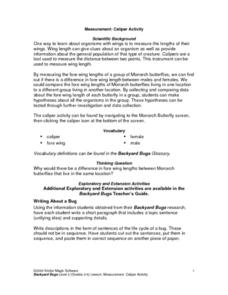Curated OER
Miracle of Winged Migration
Students explore the life cycle of insects by researching butterflies. In this insect migration lesson, students identify the Monarch butterfly, where they inhabit, and what their migration consists of. Students utilize the Internet to...
Curated OER
Signs of Spring
Students identify the first signs of Spring. They track birds and butterflies on their journey North.
Curated OER
"Caterpillars to Butterflies"
Students participate in a variety of activities about how caterpillers become butterflies.
Curated OER
Butterfly Report
In this biology worksheet, students draw or trace an accurate picture of a butterfly. Then they complete the information related to their butterfly's classification and list the habitats where they are likely to be found. Students also...
Curated OER
Cloze Activity: Mini Worlds
For this butterflies, moths, and caterpillars cloze procedure worksheet, students review a brief selection that is missing 10 words and then attempt to fill in each blank with a word they think the author might have used. A word bank is...
University of Virginia
The Very Hungry Caterpillar
Students engage in a activity that is concerned with the skill of reading comprehension while reading "The Very Hungry Caterpillar" as a class. They read the story while identifying the different types of food with the help of food cards.
Curated OER
A Day in the Life
Students use their research skills to investigate the behavior and characteristics of a rainforest animal. After creating a diary entry, they illustrate the habits and life cycle of the animal. They write the diary entry from the point...
Curated OER
Harvesting and Threshing the Seed
Students harvest and thresh the seeds. They count the seeds and compare that number with the original number of seeds planted (8) to determine their profit or loss. Finally, students think about additional questions they have about...
EngageNY
Conducting Research: Asking and Answering our Questions about Rainforest Arthropods
Let's ask an expert. Scholars divide into groups to research and become experts on either ants or butterflies. Learners use task cards and text on their topic to complete a note catcher. At the end, they share their information with a...
Curated OER
What's Happening to Our Caterpillars?
Seventh graders participate in a instructional activity making observations of caterpillars. They identify different changes in the life cycle of a caterpillar and also understand the final result of the life cycle ending.
Curated OER
The Greatest Show on Earth: The World's Smallest Animals
Students create instruments to capture different types of insects. In this The Greatest Show on Earth: The World's Smallest Animals lesson, students compare the attributes of certain insects and record the data on a chart. After catching...
Curated OER
Creature Features
Students examine why certain animals live in only specific places throughout the world. Using animals, they classify them based on their characteristics and identify their basic needs. They also observe and compare the life cycles of...
Curated OER
Milkweed Plants
Second graders view milkweed plants (or pictures). The describe the plant and discuss ways some butterflies use it as a food source. Students view four pictures of different phases of a milkweed plant's life cycle. They discuss the...
Curated OER
What Beautiful Caterpillars!
Second graders investigate the life cycle of the caterpillar. They create a caterpillar habitat and care for it. Students make daily observations that are recorded in a writing journal. During the process of observation the students...
Biology Junction
World of Insects: Characteristics, Orders, and Collecting
Every bug is an insect, but not all insects are bugs. A presentation lists the characteristics of insects, describes their body parts, and explains metamorphosis. It also details every order and includes photographs and multiple facts...
Curated OER
Butterflies An internet Scavenger Hunt
In this biology worksheet, 4th graders find the answers to a guided web search looking for the information found on the Internet focused around the subject of butterflies for the 5 problems.
Curated OER
What is An Insect?
Students investigate the concept of an insect. They conduct research about six different insects and identify the different body parts. Students look at the life cycle of the developing monarch butterfly. They also use the library to...
Curated OER
The Lepidoptera Project
Students are introduced to Scientific Inquiry and discover how to design an experiment that answers critical questions using butterflies as the topic. They design experiments that compare the number of species of butterflies in a vacant,...
Curated OER
Measurement: Caliper Actitivy
Learners participate in an investigation of winged organisms. Working with calipers, students measure the wing span of several butterflies from different areas. After recording their measurements, learners use their data to explain...
Curated OER
Caterpillar Habit
Students watch a caterpillar change and become a butterfly. In this lesson about the life cycle of a caterpillar and a butterfly, students prepare and maintain the habitat of the caterpillar. Students observe the stages of the...
Curated OER
The Very Hungry Caterpillar
Visually represent a retelling of the story by writing and illustrating their own Hungry Caterpillar book.Observe and describe the life cycle of a butterfly.Also, observe caterpillars, record growth rates and changes over time.
Curated OER
Insects
Third graders research an insect and creates a brochure on that selected insect. Each student develops a Venn Diagram comparing similarities and differences between moths and butterflies.
Curated OER
How does Temperature Affect Time in the Pupa Stage?
Students are guided through the Scientific Method to perform observations about the pupa stage of the monarch butterfly. The results of an experiment are used to make assumptions about growth and development.
Curated OER
Color by Number
In this color by number worksheet, students follow the given guide to complete the picture. Students use 7 colors to complete the picture according to the given directions.

























